

Dealing with Grief and Depression. By Omal Bani Saberi, LCSW, CCHT When part of our body is lost, we experience a grieving process much like a death.
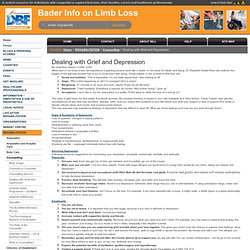
In her book On Death and Dying, Dr. Elizabeth Kubler-Ross has outlined five stages of the grieving process that occur in conjunction with dying. These stages, in the context of limb loss, are: Denial and Isolation. The cycle of grief does not flow easily. The new amputee may experience feelings of depression that are difficult to ward off. Signs & Symptoms of Depression. Body Image. Body Image: Acceptance is Step One Beauty, The Beholder, and Body Image Beauty, youth, vigor and health are extolled in our society.
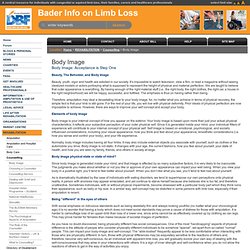
It’s impossible to watch television, view a film, or read a magazine without seeing idealized models or actors portraying what is supposed to represent the height of physical and material perfection. We are taught to believe that outer appearance is everything. By having enough of the right material stuff (i.e., the right body, the right clothes, the right car, a house in the right neighborhood) we will be happy, successful, and fulfilled. Therefore, amputation may deal a devastating blow to your body image; for, no matter what you achieve in terms of physical recovery, the simple fact is that your limb is still gone. Elements of body image Body image is your internal concept of how you appear on the exterior.
Normally, body image includes having all four limbs. Coping With the Loss. Some people are born with a limb difference, for others it is the result of injury or disease such as diabetes, and peripheral vascular disease (PVD).
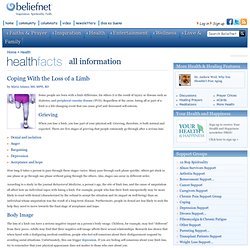
Regardless of the cause, losing all or part of a limb is a life-changing event that can cause grief and decreased self-esteem. When you lose a limb, you lose part of your physical self. Grieving, therefore, is both normal and expected. There are five stages of grieving that people commonly go through after a serious loss: Denial and isolationAngerBargainingDepressionAcceptance and hope How long it takes a person to pass through these stages varies. Psychological Aspects. By Saul Morris, PhD If you have had an amputation or are going to have one, let me assure you that others have already gone through the same experience.

You may be feeling physical pain, fear, apprehension, loneliness, uncertainty and sadness but I can assure you that you will make it though all of this. You are probably dealing with amputation because you and your doctor deemed it necessary to save your life or because it was the result of circumstances beyond your control. Either way, you had no choice. What is Counselling? Volunteer Visitors. The Limbless Association, one of our partner charities runs a nation-wide (UK & Northern Ireland only) network of volunteer visitors, each of whom has lost one or more limbs.

What does the network do? Where possible the LA try to match each client and visitor by age, sex, interests and limb loss. Therefore creating a common bond and allowing the Volunteer Visitor to draw on their own valuable experience. They provide practical advice and reassurrance to the person they are visiting but also to their family and friends – see how our volunteers help. Visits can be arranged before and after amputation, at home or at the hospital. In areas where a Volunteer Visitor is not available the LA will endeavour to arrange contact via the phone or by letter. Please note that visits are mainly requested by amputees but are open to all those with limb loss. The Role of the Counsellor. Some rehabilitation centres will have a counselling psychologist, clinical psyshologist or Nurse Counsellor on their staff.
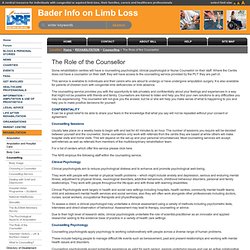
Where the Centre does not have a counsellor on their staff, they will have access to the counselling service provided by the PCT they are part of. This service is available to individuals and their carers who are about to undergo or have undergone amputation surgery. It is also available for parents of children born with congenital limb deficiencies or limb absence. The counselling service provides you with the opportunity to talk privately and confidentially about your feelings and experiences in a way that might not be possible with friends and family.
Counsellors are trained to listen and help you find your own solutions to any difficulties you may be experiencing. CONFIDENTIALITY It can be a great relief to be able to share your fears in the knowledge that what you say will not be repeated without your consent or agreement. Counselling Sessions Clinical Psychology.
Choosing a Counsellor. The British Association for Counselling & Psychotherapy (BACP), as the main body in the UK representing counselling at national and international levels, produces the directory from which the accompanying list of counsellors is taken.
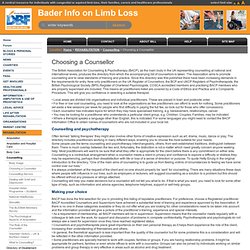
The Association aims to promote counselling and to raise standards of training and practice. Since this directory was first published there have been increasing demands in the requirements for entry. Now only practitioners on the UK Register of Counsellors, the BCP and UKCP Registers of Psychotherapists, the British Psychological Society (BPS) Register of Chartered Psychologists, COSCA accredited members and practising BACP members who are properly supervised are included.
Counselling Service. Some rehabilitation centres will have a counselling psychologist or Nurse Counsellor on their staff.
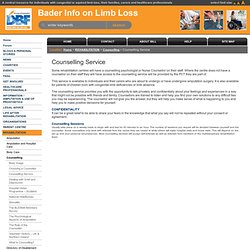
Where the centre does not have a counsellor on their staff they will have access to the counselling service will be provided by the PCT they are part of. This service is available to individuals and their carers who are about to undergo or have undergone amputation surgery. It is also available for parents of children born with congenital limb deficiencies or limb absence.